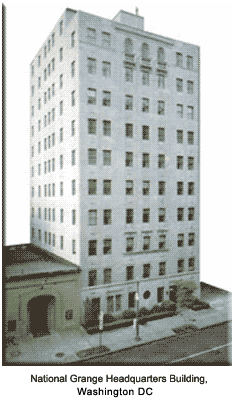Oliver Hudson Kelley was an employee of the Department of Agriculture in the 1860s. He made an official trip through the South and was astounded by the lack of sound agricultural practices he encountered. Joining with other interested individuals in 1867, Kelley formed the National Grange of the Patrons of Husbandry, a fraternal organization complete with its own secret rituals. Local affiliates were known as "granges" and the members as "grangers." In its early years, the Grange was devoted to educational events and social gatherings.
Growth was slow in the early years, but the attraction of social events was considerable. Farm life in the 19th century was marked by a tedium and isolation that usually was relieved only by church functions and the weekly trips to town for supplies.
Following the Panic of 1873, the Grange spread rapidly throughout the farm belt, since farmers in all areas were plagued by low prices for their products, growing indebtedness and discriminatory treatment by the railroads. These concerns helped to transform the Grange into a political force.
 Grange influence was particularly strong in Iowa, Minnesota, Wisconsin and Illinois, where political pressure yielded a series of "Granger laws" designed to give legislative assistance to the farmers. Those laws received an initial blessing from the Supreme Court in Munn v. Illinois (1876), but a later counteroffensive by the railroads brought the Wabash case (1886), which wiped out those gains.
Grange influence was particularly strong in Iowa, Minnesota, Wisconsin and Illinois, where political pressure yielded a series of "Granger laws" designed to give legislative assistance to the farmers. Those laws received an initial blessing from the Supreme Court in Munn v. Illinois (1876), but a later counteroffensive by the railroads brought the Wabash case (1886), which wiped out those gains.
During the 1870s, the Grangers advocated programs such as the following:
The Grange as a political force peaked around 1875, then gradually declined. New organizations with more potent messages emerged, including the Greenback Party of the 1870s, the Farmers' Alliances of the 1880s and the Populist Party of the 1890s.
The Grange had played an important role by demonstrating that farmers were capable of organizing and advocating a political agenda. After witnessing the eclipse of its advocacy efforts by other groups, the Grange reverted to its original educational and social events. These have sustained the organization to the present day.